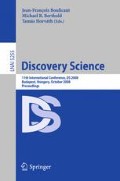Abstract
This paper proposes initial steps towards a generic framework for modeling the scientific process. It is generic according to two main axes. First, it can be instantiated to cover various types of inferences usually considered relevant in science, second, and more important here, it allows for the modeling of the social dimension of scientific activity. After motivating this drive for genericity by looking at some results from philosophy of science, the paper presents the bases of the framework and its central reliance on the notion of consistency, both at the individual and group levels. It then instantiates the social dimension of the framework by proposing an actor-critic model of scientific interaction. The ideas proposed are illustrated with examples of hypothesis formation in medicine.
Access this chapter
Tax calculation will be finalised at checkout
Purchases are for personal use only
Preview
Unable to display preview. Download preview PDF.
References
Bourgne, G.: Propagation et Affinement d’Hypot’eses sous Contraintes Communicationnelles. PhD thesis, Université Dauphine - LAMSADE (2008)
Bourgne, G., Seghrouchni, A.E.F., Maudet, N.: Towards refinement of abductive or inductive hypothesis through propagation. In: Pre-Proc. of AIAI 2007, October 2007, pp. 20–40 (2007)
Bourgne, G., El Fallah Seghrouchni, A., Soldano, H.: Smile: Sound multi-agent incremental learning. In: AAMAS, pp. 164–171. ACM Press, New York (2007)
Corruble, V., Ganascia, J.-G.: Induction and the discovery of the causes of scurvy: A computational reconstruction. Artificial Intelligence 91(2), 205–223 (1997)
Curd, M.V.: The logic of discovery: an analysis of three approaches, Reidel, pp. 173–183 (1980)
Darden, L.: Anomaly-Driven Theory Redesign: Computational Philosophy of Science Experiments, pp. 62–78. Blackwell Publishers, Malden (1998)
Dietterich, T.G.: Ensemble Learning, pp. 405–408. MIT Press, Cambridge (2002)
Flach, P.A.: Abduction and induction: syllogistic and inferential perspectives. Technical report, University of Bristol, Bristol, UK (1996)
Klahr, D., Simon, H.A.: Studies of scientific discovery: Complementary approaches and convergent findings. Psychological Bulletin 125(5), 524–543 (1999)
Kuipers, T.A.F.: Structures in Science – Heuristic Patterns Based on Cognitive Structures. Kluwer Academic Publishers, Dordrecht (2001)
Kulkarni, D., Simon, H.A.: Experimentation in Machine Discovery. Morgan Kaufmann, San Francisco (1990)
Langley, P.: Bacon.1: A general discovery system. In: Proc. of Canadian AI 1978, Toronto, Ontario, pp. 173–180 (1978)
Latour, B.: Laboratory Life: The Social Construction of Scientific Facts (SAGE Library of Social Research), June 1979. Sage Publications, Inc., Thousand Oaks (1979)
Laudan, L.: Why Was the Logic of Discovery Abandoned?, pp. 173–183 (1980)
Longino, H.E.: Science as Social Knowledge: Values and Objectivity in Scientific Inquiry. Princeton University Press, Princeton (1990)
Ontañon, S., Plaza, E.: Recycling data for multi-agent learning. In: ICML 2005, pp. 633–640. ACM Press, New York (2005)
Popper, K.: The Logic of Science Discovery, Routledge, London (1959)
Schaffner, K.F.: Discovery and Explanation in Biology and Medicine. The university of Chicago Press, Chicago (1993)
Simon, H.A.: Does scientific discovery have a logic? Philosophy of Science 40(4), 471–480 (1973)
Thagard, P.: Computational philosophy of science. MIT Press, Cambridge (1988)
Wajnberg, C.D., Corruble, V., Ganascia, J.G., Moulines, C.U.: A structuralist approach towards computational scientific discovery. Knowledge Discovery 3245, 412–419 (2004)
Wang, J., Gasser, L.: Mutual online concept learning for multiple agents. In: AAMAS, pp. 362–369. ACM Press, New York (2002)
Author information
Authors and Affiliations
Editor information
Editors and Affiliations
Rights and permissions
Copyright information
© 2008 Springer Berlin Heidelberg
About this paper
Cite this paper
Bourgne, G., Corruble, V. (2008). A Framework for Knowledge Discovery in a Society of Agents. In: Jean-Fran, JF., Berthold, M.R., Horváth, T. (eds) Discovery Science. DS 2008. Lecture Notes in Computer Science(), vol 5255. Springer, Berlin, Heidelberg. https://doi.org/10.1007/978-3-540-88411-8_18
Download citation
DOI: https://doi.org/10.1007/978-3-540-88411-8_18
Publisher Name: Springer, Berlin, Heidelberg
Print ISBN: 978-3-540-88410-1
Online ISBN: 978-3-540-88411-8
eBook Packages: Computer ScienceComputer Science (R0)

